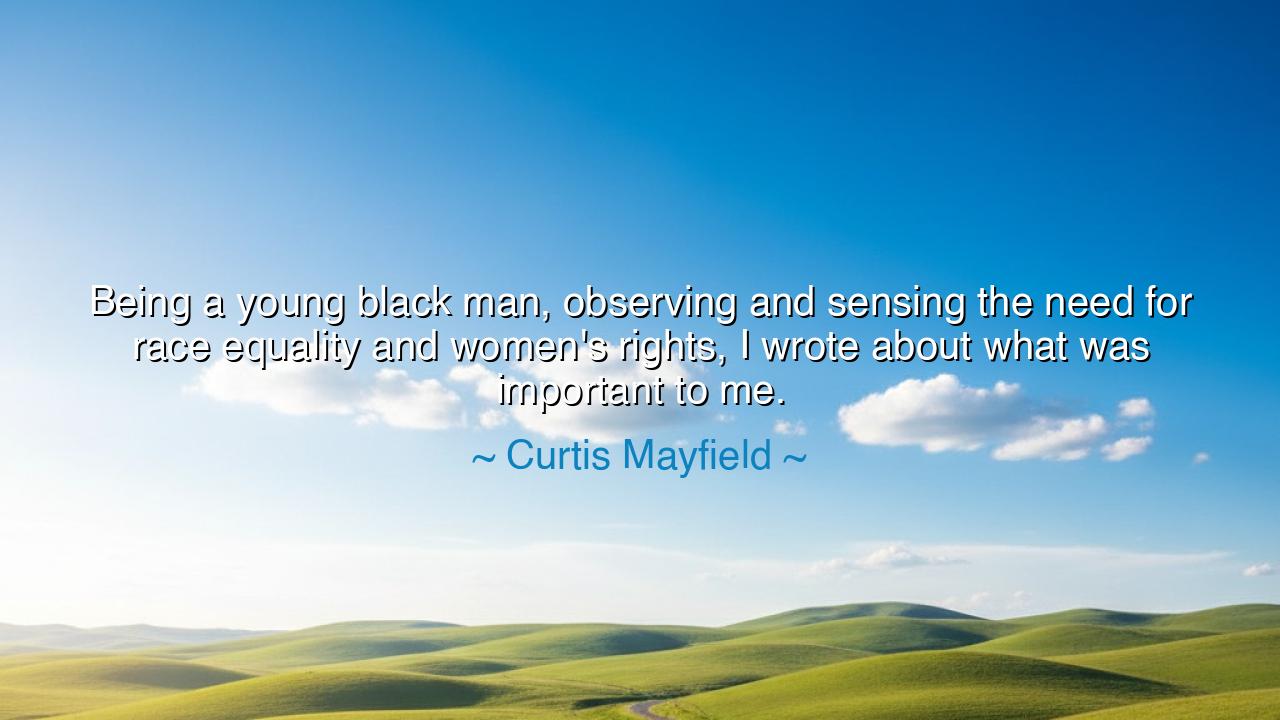
Being a young black man, observing and sensing the need for race
Being a young black man, observing and sensing the need for race equality and women's rights, I wrote about what was important to me.






In the ancient world, the voices of the oppressed were often drowned by the weight of empires, and the struggles for justice and equality seemed distant dreams. Yet, in the depths of human history, there have always been those who, despite their circumstances, rise above their personal hardships to speak on behalf of those who have no voice. The words of Curtis Mayfield—"Being a young black man, observing and sensing the need for race equality and women's rights, I wrote about what was important to me"—speak to the soul of a man who understood, as the ancient philosophers did, that truth and justice can never be separated from the personal struggles of individuals. For Mayfield, music was not just art; it was a medium to bring attention to the most pressing issues of his time.
To be a young black man in the face of systemic oppression and inequality is to feel the weight of the world on one’s shoulders. The struggles of race equality are deeply etched into the fabric of the African American experience, as they are in the stories of countless oppressed peoples throughout history. Mayfield, much like the ancient griots—the storytellers of Africa—understood that music and poetry are powerful tools for resistance. By writing about what mattered most to him—issues of race, equality, and the struggles of women—he became a voice of not just his generation, but of generations to come, using his craft to articulate the pain, the joy, and the hopes of the oppressed.
Look to the story of Sojourner Truth, the great abolitionist and advocate for women’s rights, who, though born into slavery, rose above her circumstances to speak out on behalf of the marginalized. Her famous speech, "Ain’t I a Woman?" is a testament to the unbreakable bond between the struggles for racial equality and women’s rights. Just as Mayfield observed the need for change in his time, Sojourner Truth recognized that race and gender were inseparable struggles—two chains that bound the human spirit and must be broken together. Truth’s voice, like Mayfield’s music, transcended her own personal suffering to become a rallying cry for those whose freedom had long been denied.
Mayfield’s commitment to writing about what mattered was not merely an artistic expression, but a sacred duty—a call to action. His songs, infused with both the urgency and the heartbreak of the time, were meant to awaken society to the realities of inequality. Much like the prophets of old, he spoke not only to his own people, but to the world, offering both a mirror of society’s failings and a path forward. His music was a weapon of truth, used to fight against the forces of oppression, and to demand that those in power recognize the humanity and rights of all people, regardless of race or gender.
The lesson here is clear: the struggle for equality is a universal cause, and the fight for justice is not just the work of activists or leaders, but of every person who is willing to speak truth to power. Mayfield’s legacy reminds us that each of us, in our own way, can contribute to the fight for justice. Whether through music, art, words, or action, we must stand up for what is right and refuse to remain silent in the face of injustice. It is not enough to simply observe the world around us and be passive. We must, like Mayfield, write, sing, or speak about what is important, what is necessary, and what is moral.
In your own life, take this message to heart: what you care about matters. Just as Curtis Mayfield used his music to speak for the oppressed, so too can your voice—your actions—be a force for good in the world. Speak up for those who cannot speak for themselves, and never underestimate the power of your words or your creative expressions. Whether you are fighting for racial equality, gender equality, or any cause that aligns with the principles of justice, understand that your efforts, no matter how small, contribute to a greater movement. The path to equality is not easy, and it is not short, but it is a path that requires each of us to walk with purpose and passion.
Remember, the struggle for justice and equality is not just about the battles of the past—it is the fight that continues in every generation. As Mayfield’s music lives on to inspire others, so too must our efforts for a more just world live on through our words, our actions, and our commitment to the cause. Stand firm, speak with integrity, and always remember that the fight for equality is not only a fight for others—it is a fight for the very soul of humanity.






AAdministratorAdministrator
Welcome, honored guests. Please leave a comment, we will respond soon